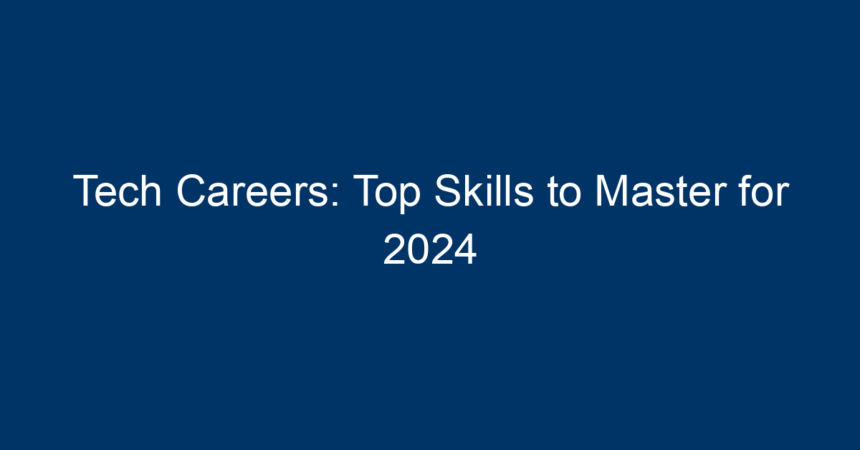As the technology landscape evolves at lightning speed, so do the skills required to thrive in the industry. For professionals eyeing tech careers in 2024, adapting to new trends and being equipped with the right skills is crucial. Whether you are a seasoned tech veteran or a fresh graduate, understanding the skills that are in high demand can set your career on a trajectory for success. In this article, we’ll explore the top skills you should master to excel in tech careers this year, providing insight into what employers are looking for and how you can position yourself as a valuable asset.
The Growing Demand for Tech Skills
Before diving into specific skills, it’s essential to understand the backdrop against which these requirements are set. The global pandemic accelerated digital transformation in almost every industry, resulting in an unprecedented demand for tech professionals. According to the U.S. Bureau of Labor Statistics, employment in tech careers is projected to grow 22% from 2020 to 2030, much faster than the average for all occupations. This demand creates an excellent opportunity for those ready to invest time in mastering relevant skills.
1. Data Literacy
Understanding Data’s Role in Decision-Making
Data is at the heart of most tech careers. The ability to read, interpret, and visualize data has become a foundational skill. As businesses increasingly rely on data-driven decision-making, being data literate is non-negotiable. Familiarity with data analytics tools like Tableau, Power BI, or programming languages like R and Python can set you apart from the competition.
Building Your Data Skills
To build your data literacy, consider enrolling in online courses or certifications focused on data analysis. Many platforms offer free resources so you can get started without a significant investment.
2. Cybersecurity Awareness
The Critical Need for Cybersecurity
With the rise in cyber threats, cybersecurity has emerged as a top concern for organizations. Companies are actively seeking professionals skilled in identifying and mitigating risks. A robust understanding of cybersecurity principles not only bolsters your resume but also prepares you to handle sensitive data responsibly.
Getting Started in Cybersecurity
To break into cybersecurity, consider obtaining certifications like CompTIA Security+ or Certified Ethical Hacker (CEH). Many online platforms also offer beginner courses tailored to those new to the field.
3. Cloud Computing Proficiency
Why Cloud Skills Matter
As more companies migrate their operations to the cloud, skills related to cloud computing are increasingly vital in tech careers. Familiarity with platforms like AWS, Google Cloud, and Microsoft Azure can greatly enhance your employability.
How to Master Cloud Computing
Start with learning the fundamentals of cloud services and architecture. Online training programs often offer free access to introductory cloud courses. Additionally, pursuing cloud certifications can validate your skills to potential employers.
4. Machine Learning and AI
The Future of Technology
Artificial Intelligence (AI) and Machine Learning (ML) are transforming industries from healthcare to finance. Understanding how to apply ML algorithms and create AI-driven applications is becoming essential for many tech careers.
Steps to Learn Machine Learning
Begin with online courses focused on ML and AI, covering topics like neural networks, natural language processing, and deep learning. Hands-on projects can help solidify your understanding and make your portfolio more attractive.
5. Agile Methodologies
The Shift Towards Agile Practices
Agile methodologies have revolutionized the way tech teams operate, promoting flexibility and collaboration. Knowledge of Agile frameworks like Scrum and Kanban is beneficial across various tech careers, including project management and software development.
Learning Agile Methodologies
Consider pursuing certifications like Certified ScrumMaster (CSM) or Agile Certified Practitioner (PMI-ACP). Participating in Agile workshops can also provide practical insights into implementing these methodologies effectively.
6. User Experience (UX) Design
Understanding the Importance of UX
User Experience design focuses on the overall feel of the product and its usability. Companies are increasingly seeking professionals who can create intuitive and engaging user interfaces. A strong ability to empathize with users and design in accordance with their needs can greatly enhance your appeal in tech careers.
Building Skills in UX Design
Enroll in UX design courses that cover user research, wireframing, prototyping, and usability testing. Creating a portfolio showcasing your designs and user-centered projects can significantly improve your chances in the job market.
7. Programming and Software Development
Why Programming Remains Crucial
Programming skills remain fundamental in tech careers. Languages like Python, JavaScript, and Java are prevalent across many domains. Whether you aim to become a software developer, data analyst, or web developer, mastering at least one programming language is vital.
How to Enhance Your Programming Skills
Start by learning programming fundamentals through online coding platforms. Consider building small projects that can demonstrate your capabilities, making your resume stand out with tangible evidence of your skills.
8. Critical Thinking and Problem-Solving
The Soft Skills That Matter
While technical skills are essential, soft skills like critical thinking and problem-solving are equally important in tech careers. Employers value professionals who can analyze situations and devise effective solutions, particularly in high-pressure environments.
Developing Critical Thinking Abilities
Engage in activities that require strategic thinking, such as puzzles and brainstorming sessions. Participating in hackathons can also enhance your problem-solving skills while allowing you to collaborate with other tech enthusiasts.
Conclusion: Taking Action for Your Tech Career
Mastering the skills outlined above can significantly enhance your prospects in the rapidly evolving world of tech careers. As we move further into 2024, focus on continuous learning and self-improvement in these areas. Here are some actionable insights to help you get started:
-
Create a Learning Plan: Identify which skills resonate most with your career goals and set a timeline for acquiring them.
-
Engage with the Community: Join online forums, attend webinars, or participate in local meet-ups to network with professionals and learn from their experiences.
-
Hands-On Projects: Apply what you learn through real-world projects. Building a portfolio can set you apart from others when seeking employment.
-
Certifications: Invest in relevant certifications that can validate your skills and knowledge.
- Stay Updated: Follow industry trends through blogs, podcasts, and newsletters. Keeping abreast of new developments will help you remain competitive.
By focusing on these skills and taking proactive steps, you can position yourself for success in the tech careers of the future. Embrace the journey of continuous learning, and watch as doors of opportunity begin to open.




